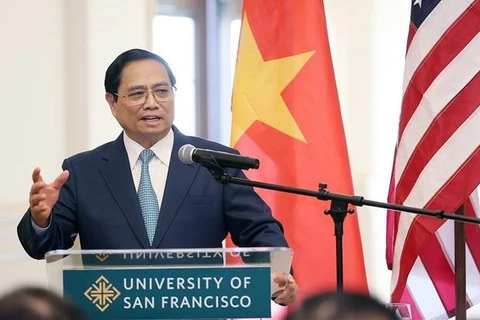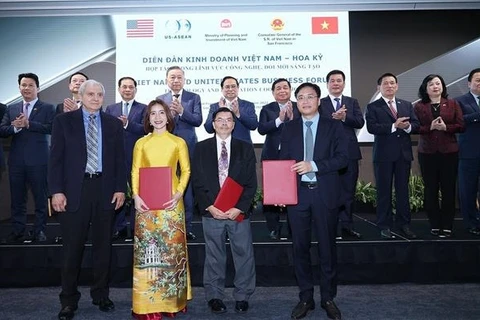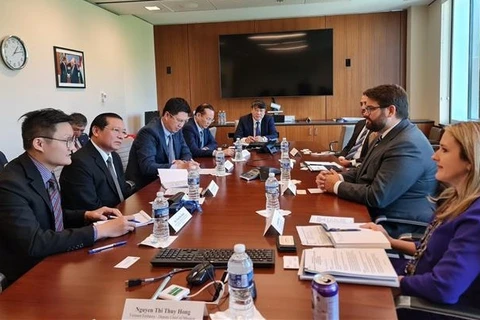 Party General Secretary Nguyen Phu Trong and President Joe Biden in the flag-saluting ritual at the welcome ceremony for the US President in Hanoi. (Photo: VNA)
Party General Secretary Nguyen Phu Trong and President Joe Biden in the flag-saluting ritual at the welcome ceremony for the US President in Hanoi. (Photo: VNA) Hanoi (VNA) – The upgrading of the relations with the US demonstrates Vietnam’s consistent foreign policy of being a good friend and a reliable partner of all countries worldwide, and a responsible member of the international community.
President Joe Biden paid an official visit to Vietnam from September 10-11, 2023, an important event for the Southeast Asian nation.
Attracting global attention
It can be said that this was a historically significant event.
This is the first time a US President has visited Vietnam at the invitation of a Party General Secretary. Earlier, during their high-level online talks late March, the two leaders exchanged invitations to visit the respective countries. Both accepted each other's invitations.
Biden's visit, as announced by the White House, was aimed at meeting with Vietnam's high-ranking leaders and " discussing ways to further deepen cooperation between the US and Vietnam.”
Additionally, this marked the first time since 1995 that both the President and Vice President of the US have visited the Southeast Asian nation in the same term. Vice President Kamala Harris visited Vietnam from August 24-26, 2021.
Biden’s visit coincided with the 10th anniversary of the establishment of the comprehensive partnership between the two countries.
Vietnam and the US established diplomatic ties in 1995, paving way for the development of bilateral relations.
Then President Truong Tan Sang held talks with US President Barack Obama on July 25, 2013, at the White House, during which they decided to establish a comprehensive partnership based on the principles of respecting the UN Charter and international law, and each other’s political institutions, independence, sovereignty, and territorial integrity.
It is noteworthy that Bill Clinton was the first US President to visit Vietnam (in November 2000) after the two countries established diplomatic relations. Since then, subsequent US Presidents also visited the Southeast Asian nation, including George W. Bush (November 2006), and Barack Obama (May 2016). Donald Trump, in particular, visited Vietnam twice during his tenure from 2017 to 2021.
All have reflected the positive development of the Vietnam-US relationship, and US interest in Vietnam, reaffirmed through Biden's visit. Vietnam offered a warm welcome to him with the highest protocol for a head of state.
During this visit, President Biden had meetings with many of Vietnam's top leaders. It was during his meeting with Party General Secretary Trong that both sides confirmed the elevation of their bilateral relationship to a Comprehensive Strategic Partnership for peace, cooperation, and sustainable development.
This event has evidently captured great attention from the global media, including New York Times, Reuters, AP, AFP, Guardian, EIU, Nikkei, NHJ and Wall Street Journal. All provided assessments and analyses of the future of the Vietnam-US relations.
Reuters said the upgrading of the relations is the result of decades-long efforts by both sides to build the bilateral relationship. Meanwhile, Financial Times called it “a symbolic but significant change” and CNN stressed that US wants to be a reliable partner of Vietnam and the region.
For President Biden personally, he had kind words for Vietnam during and after his visit. His account on social network X provided updates on his activities in the Southeast Asian nation, starting with a status upon his arrival in Hanoi, "Thank you for the warm welcome, Vietnam. I know this will be a historic visit."
In subsequent updates, the President shared photos of the welcome ceremony hosted by the Vietnamese Party chief at the Presidential Palace in Hanoi, saying “As I said earlier, Vietnam and the US have an enormous opportunity to be critical partners. I know we can achieve the aspiration both countries share for a future of greater peace, security, and prosperity."
This reflects the importance the President attaches to Vietnamese people as well as the bilateral relationship.
Old rhetoric
However, these positive changes seem not to be enough to satisfy some individuals and organisations both at home and abroad that want to sabotage Vietnam. They are not content with any positive changes or progress that Vietnam has achieved.
Even during President Biden's visit, there were numerous articles published on news sites such as BBC’s and VOA’s Vietnamese language websites, and the Facebook account of Viet Tan – a terrorist organisation, which offered divergent opinions with different motives and calculations.
As usual, during high-level visits by US leaders to Vietnam, forces without goodwill often raise the so-called "human rights violations" in Vietnam. In some articles on its official website and Facebook, VOA Vietnam continually mentioned human rights issues and wrote about the cases of "prisoners of conscience" and “divergent opinions” and those arrested due to their violations of Vietnamese law. In late September, the website continued citing “reputable experts” as saying Vietnam has no economic freedom.
Such information and rhetoric are not new. They simply represented an attempt to deny the significant progress Vietnam has made in terms of human rights and freedoms.
In fact, many international politicians and scholars have expressed their impressions on the successes Vietnam has achieved over 30 years of reform. This is especially so in socioeconomic development, ensuring human rights, and achievements that are ahead-of-schedule for many Millennium Development Goals (MDGs).
According to the UN, Vietnam's Human Development Index (HDI) has consistently increased over the years, ranking 115th out of 191 countries and territories worldwide.
Vietnam’s efforts in promoting human rights have also been acknowledged by the US. The joint statement on elevating the Vietnam-US relations to a Comprehensive Strategic Partnership devoted one part to “protecting and promoting human rights”. This mirrored the two sides’ frankness, openness and willingness to exchange views on issues relating to people and human rights.
It said the leaders affirmed the importance of promoting and protecting human rights in accordance with each country’s constitution and international obligations.
Both countries pledged continued support for the promotion and protection of human rights, including through frank and constructive dialogues such as the annual Vietnam – US Human Rights Dialogue and Vietnam – US Labour Dialogue, to strengthen mutual understandings and narrow differences.
They encouraged further cooperation to ensure that everyone, including members of vulnerable groups, regardless of their gender, race, religion, or sexual orientation, and including persons with disabilities, fully enjoy inalienable human rights.
Deliberately creating “divergent opinions”
Apart from focusing on human rights issues, some foreign media outlets deliberately made inaccurate and distorted statements about Vietnam's foreign policy.
BBC’s Vietnamese language website, for example, ran an article saying Vietnam had "taken sides" by leaning towards the US to oppose China. VOA also "provoked" by publishing an article saying the new cooperation could enable Vietnam to access US weapons and turn away from reliance on Russia – its traditional supplier.
Reactionary groups like Viet Tan also continually published articles distorting Vietnam’s "bamboo diplomacy" and mocking the country's leadership. Quite a few opinions diminished the significance of the Vietnam-US relationship in order to defame Vietnamese Party and State leaders.
Clearly, these are all misleading, groundless allegations that have failed to accurately reflect the reality. Upgrading relations with the US does not mean that Vietnam has chosen to align with one side to oppose another. In fact, the country’s foreign policy has been repeatedly clarified by its top leaders.
Specifically, in an interview granted to the press in late 2022, Prime Minister Pham Minh Chinh affirmed that Vietnam pursues the foreign policy of independence, self-reliance, diversification, and multilateralisation of relations. This includes being a good friend and a reliable partner of all countries in the world, for peace, cooperation and development, and a responsible member of the international community.
The Government leader stressed that Vietnam does not take sides but chooses justice and righteousness.
“Therefore, we demonstrate this spirit in international affairs for peace, cooperation, and development in the region and the world in line with our country's foreign policy,” he said.
Hence, it is evident that the elevation of the Vietnam-US relations is one of the many foreign activities Vietnam is implementing to serve the long-term interests of the country and its people, rather than choosing sides or opposing anyone.
The upgrading of the relations reflects the convergence of interests between the two countries, as well as the commitment to long-term cooperation to deepen economic ties through trade, investment, technology exchanges, and good governance practices, said Professor Carl Thayer from the Australian Defence Force Academy, the University of New South Wales.
Currently, the US is one of Vietnam's largest trading partners. As of August 2023, Vietnam imported goods worth over 9 billion USD from the US and exported over 62 billion USD to the country. The US has been Vietnam's largest export market and has maintained the highest trade surplus for Vietnamese goods for many years. China also plays a crucial role as a supplier of raw materials to serve Vietnam’s production.
The US is a big investor in Vietnam, with over 1,100 operational projects and more than 10 billion USD poured into over 20 economic sectors. Following the establishment of the Comprehensive Strategic Partnership, many sectors like semiconductor industry, electronics, and rare earth mining are expected to draw substantial investments from the US.
However, China is also a significant player with over 3,700 valid projects in Vietnam and a total registered capital of more than 25 billion USD. Therefore, both the US and China are important economic and trade partners of Vietnam. Thus, the intentional distortion of Vietnam “aligning with the US" to “oppose China” is entirely inaccurate.
For national defence and security, Vietnam's stance is not to join any military alliance, and not to allow any foreign country to establish military base in Vietnam or use Vietnam’s territory to attack others. Vietnam is also firm in its stance of not joining one country against a third country, and not using force or threatening to use force in international relations.
This stance means that any cooperation in defence and security, including with the US, is solely for peace, cooperation, and sustainable development, rather than for the purpose of "opposing" or "turning away" from anyone.
Advancing the relationship with the US to a level equal to that with China, Russia, India, and the Republic of Korea (RoK) is not in contradiction of Vietnam’s foreign policy of being a good friend and a reliable partner with all countries worldwide, and an active and responsible member of the international community.
This is a manifestation of the foreign policy of openness, and the diversification and multilateralisation of relations. This has enabled Vietnam to establish diplomatic relations with nearly 200 countries and territories. Certainly, in the future, Vietnam will continue to establish Comprehensive Strategic Partnerships with many other countries as it persists with this policy./.
























